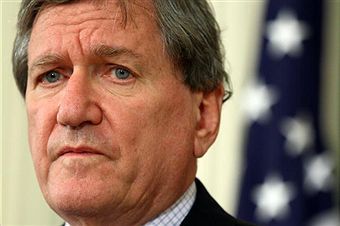 He was known as brash and abrasive. A gale force wind. The “bulldozer” some
called him based on his time bullying Slobodan Milosevic during the Dayton negotiations to end the Bosnian War in the 1990s.
He was known as brash and abrasive. A gale force wind. The “bulldozer” some
called him based on his time bullying Slobodan Milosevic during the Dayton negotiations to end the Bosnian War in the 1990s.
However, veteran US diplomat Richard Holbrooke, who died last night, had a far greater register. When he visited London before assuming his latest post, as President Obama’s AfPak envoy, he surprised the US embassy staff by travelling alone, with no bag-carrying entourage, and exhibiting none of the airs he was expected to have.
His first experience of the Balkans was not as the all-mighty diplomatic trouble-shooter, but as a normal citizen eager to highlight the plight of the refugees. He braved sniper fire and dangerous roads to document Yugoslavia’s tragedy.
Make no mistake, Holbrooke was renowned for his considerable ego. He could persuade, argue, flatter and even shout at his interlocuters. He once told Paddy Ashdown that all the problems of Bosnia lay not in his design of the country’s constitution, which was perfect, but in the international community’s implementation of the design, which had not followed his instructions as he had wanted.
His most admirable traits – and one found in most successful leaders – was the ability to draw people to him, make them part of his circle. As his former boss and friend Strobe Talbot once
wrote:
‘Holbrooke could make people “signed-up Holbrookeans”, loyal to him, his methods and his cause. His circle of loyalists extended across continents and professions and were particularly well represented in the media.’
Holbrooke cut his diplomatic teeth in Vietnam and worked for four Democratic presidents, from Lyndon Johnson to Barack Obama. As Frank Wisner, a former U.S. ambassador to India and friend of Holbrooke noted. “Since the Vietnam War, there has been no issue of national significance that he has not paid attention to or worked on.”
Of all his efforts, however, it was his last assignment, as US special representative for Afghanistan and Pakistan, which proved the most difficult. He once told a mutual friend that he would even have taken the job if George W Bush had offered it.
Once in the post he spent two years visiting Asia and re-shaping US policy. Based on his experience not only at the Dayton negotiations but as part of the 1968 US delegation in Paris, led by W. Averell Harriman, that opened negotiations with North Vietnam, Holbrooke spent considerable time thinking about the prospect of negotiations with the Taliban. But for months, he dealt with speculation that his days as the US envoy were numbered and being sidelined first by Hamid Karzai and then by General David Patraeus.
Few people saw and influenced the pre-Wikileaks era of US diplomacy in the that way Richard Holbrooke did. His passing is not only a personal tragedy but a great loss for US diplomacy and prospects for an orderly transition of NATO troops out of Afghanistan.






Comments